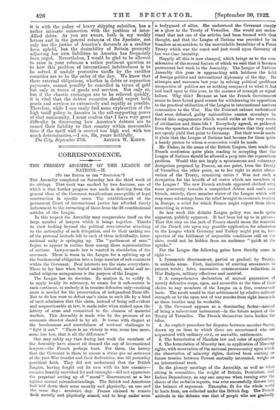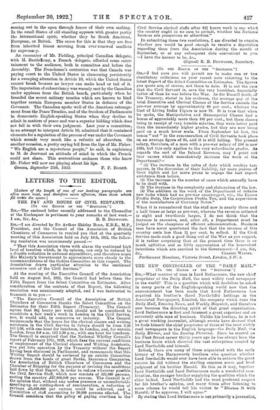CORRESPONDENCE.
'111E PRESENT ASSEMBLY OF THE T.F.A.GUE OF NATIONS.—II.
(To TEM EDITOR OP Tall " SPECTAT0/01 TEE Assembly completed on Saturday last the third week of its sittings. That week was marked by two features, one of which is that further progress was made in deriving from the general ideas of the Covenant ramifications susceptible of legal construction in specific cases. The establishment of the permanent Court of international justice has afforded timely inducement to the extracting of these from the 26 constitutional articles of the League.
In this respect the Assembly may congratulate itself on the large number of lawyers which it brings together. Thanks to their looking beyond the political .sous-intendus attaching to the nationality of each delegation, and to their making use of the personal latitude left to each of them individually, inter- national unity is springing up. The "parliament of man" begins to appear in outline from among those representatives of nations. Lawyer-made law is wetted in elucidation of the covenant. There is room in the League for a splitting up of the fundamental obligation into a large number of sub-contracts within the Covenant. Real interests are the same everywhere. These to lay bare when buried under historical, racial and so- called religious antagonisms is the purpose of the League.
The League has its doctrine. To analyse it, to codify it, to apply locally its relevancy, to create for it sub-centres in each continent, to embody it in treaties defensive only—nothing more is needed for the preservation of independent State-life. But to do less were to defeat one's claim to such life by a kind of tacit admission that this claim, instead of being self-evident and unquestionable at law, is made safer when staked upon the lottery of arms and committed to the chances of material warfare. This Assembly is made wise by the pressure of an economic disaster shared in by all. It teems with disgust at the bootlessness and wastefulness of national challenges to "fight it out." "There is no victory in war, some lose more, some lose less, that is all tho difference."
One may safely say that during last week the members of the Assembly have almost all donned the cap of international lawyers—the French perhaps least. For them, the heresy that the Covenant is there to ensure a status quo ad aeternuna, of the post-War treaties and their derivatives, was till yesterday pontifical faith. They did not understand that the British Empire, having fought out its case with its late enemies— enemies heartily unwished for and unsought—did not appreciate the perpetual setting up of " moral " disarmament as a bar against mutual misunderstandings. The British and Americans had laid down their arms morally and physically, on one and the same day : armistice day. France claimed to remain both morally and physically armed, and to keep under arms
a bodyguard of allies. She understood the Covenant simply as a gloss to the Treaty of Versailles. She would not under-
stand that net one of the articles had been framed with that thought, and that the League of Nations was provided by its founders as an antidote to the unavoidable brutalities of a Peace Treaty which was the exact and just recoil upon Germany of her war-time brutality.
Happily all this is now changed, which brings us to the con. sideration of the second feature of which we said that it became paramount last week in the Assembly. The League of Nations Assembly this year is approaching with boldness the field of foreign politics and international diplomacy of the day. Its attempts and successes last year in solving political problems irrespective of polities are as nothing compared to what it has laid itself open to this year, in the manner of triumph or signal failure. Why this ? Because at last the French Government seems to have found good reason for withdrawing its opposition to the practical utilisation of the League in international matters consecutive to the War. Has the Poincare cabinet understood that even defeated, guilty nationalities cannot nowadays be forced into engagements which would strike at the very roots of civilisation and State-life ? Everybody agreed, or gathered from the speeches of the French representatives that they could not openly yield that point to Germany. But their words mada it plain that the League of Nations had become for them quite a handy person to whom a concession could be made.
Mr. Fisher, in the name of the British Empire, then made the French confession quite plain reading in accepting that the League of Nations should be allowed a peep into the reparations problem. Would this not imply a spontaneous and voluntary derogation proposed by France, on one point, from the Treaty of Versailles, the other point, as to her right to strict obser- vation of the Treaty, remaining entire ? Was not such a derogation for the benefit of all states which are members of the League ? The new French attitude appeared clothed with some generosity towards a vanquished debtor and one's own friends, namely, those member states of the League which will reap some advantage from the relief brought to economic tension in Europe, a relief for which France might expect from them something in return.
So last week this definite League policy was made quite apparent, publicly apparent. It had been led up to in private. That this step on the part of France should mean the removal of the French veto upon any possible application for admission to the League which Germany and Turkey might put in, irre- spective of the fulfilment of impossible conditions still on the slate, could not be hidden from an audience "quick at the uptake."
For the League the following gains have thereby come in sight :—
1. Symmetric disarmament, partial or gradual, by Treaty, in suitable areas. Fast, limitation of existing armaments to present totals ; later, successive commensurate reductions in War Budgets, military effectives and matdriel.
2. A comprehensive declaration of mutual guarantees of merely defensive scope, open, and accessible at the time of their choice to any members of the League on a free, contractual basis. The result would be that arbitrament by relative military strength or by the open test of war recedes from sight insomuch as these treaties may be workable.
3. The Covenant appears as a dominating factor—instead of being a subservient instrument—in the future aspect of the Treaty of Versailles. The French themselves have broken the taboo.
4. An explicit procedure for disputes between member States, drawn up on lines to which those are accustomed who are acquainted with ordinary civil, or amicable, settlements.
5. The formulation of Mandate law and rules of application.
6. The formulation of Minority law, in application of Minority rights, with reservation of the national paramountcy upon which the observation of minority rights, derived from existing or future treaties between Powers mutually interested, weighs as an international trust.
In the plenary meetings of the Assembly, as well as when sitting in committee, the weight of Britain, Dominions, and Indian Dependency, as any one may see when turning over the sheets of the verbatim reports, was ever successfully thrown into the balance of argument. Examples, fit for the whole world to learn from, we collected under the British flag. The French attitude in the debates was that of people who are gradeall ' owning out in the open through fences of their own making. In the small States of old standing appears with greater purity the international spirit, whether they be South American, European, or British. The cause for this is that they are free from inherited biases accruing from ever-renewed conflicts for supremacy.
An encounter of Mr. Fielding, principal Canadian delegate, with M. Barthelamy, a French delegate, afforded some enter- tainment to the audience, both in committee and before the Assembly. The Frenchman's contention was that Canada was paying court to the United States in clamouring persistently for a sweeping alteration in Article 10, which the United States cannot break because no lawyer can make head or tail of it. The imputation of subserviency was warmly met by the Canadian under applause from the British bench, particularly when he branded the secret military treaties which are known to bind together certain European member States in defiance of the Covenant. The Canadian spoke well of the American estrange- ment from the Peace Treaties, and of the freedom of Parliaments in democratic English-speaking States when they decline to admit in matters of peace and war a superior bidding which does not fall in with their own judgment. Last year a committee, in an attempt to interpret Article 10, admitted that it contained elements for a regulation of the process of war under the Covenant which sounds very much like a reductio ad absurdum. On another occasion, a pretty saying fell from the lips of Mr. Fisher. "We English are a mysterious people," he said, in explaining to M. de Jouvenel an attitude of mind in which the French could not share. This sententious archness those who know Mr. Fisher will now see playing about his lips.
Geneva, September 25th, 1922. F. F. ROGET.



































 Previous page
Previous page